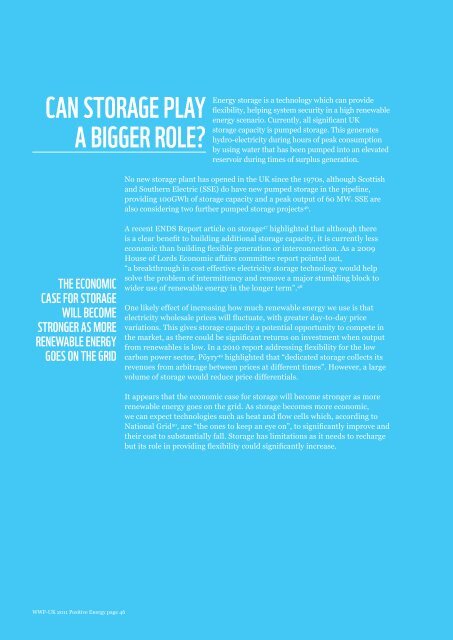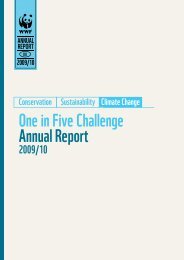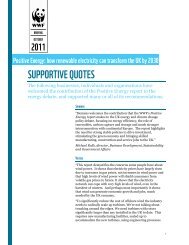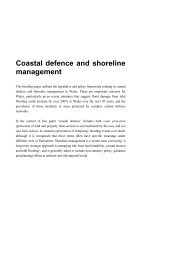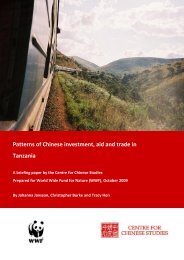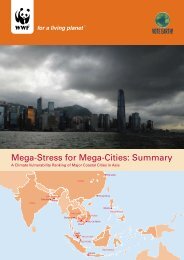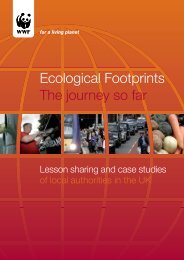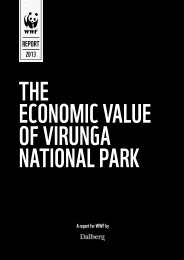Positive Energy: how renewable electricity can transform ... - WWF UK
Positive Energy: how renewable electricity can transform ... - WWF UK
Positive Energy: how renewable electricity can transform ... - WWF UK
Create successful ePaper yourself
Turn your PDF publications into a flip-book with our unique Google optimized e-Paper software.
Can storage play<br />
a bigger role<br />
<strong>Energy</strong> storage is a technology which <strong>can</strong> provide<br />
flexibility, helping system security in a high <strong>renewable</strong><br />
energy scenario. Currently, all signifi<strong>can</strong>t <strong>UK</strong><br />
storage capacity is pumped storage. This generates<br />
hydro-<strong>electricity</strong> during hours of peak consumption<br />
by using water that has been pumped into an elevated<br />
reservoir during times of surplus generation.<br />
No new storage plant has opened in the <strong>UK</strong> since the 1970s, although Scottish<br />
and Southern Electric (SSE) do have new pumped storage in the pipeline,<br />
providing 100GWh of storage capacity and a peak output of 60 MW. SSE are<br />
also considering two further pumped storage projects 46 .<br />
THE ECONOMIC<br />
CASE FOR STORAGE<br />
WILL BECOME<br />
STRONGER AS MORE<br />
RENEWABLE ENERGY<br />
GOES ON THE GRID<br />
A recent ENDS Report article on storage 47 highlighted that although there<br />
is a clear benefit to building additional storage capacity, it is currently less<br />
economic than building flexible generation or interconnection. As a 2009<br />
House of Lords Economic affairs committee report pointed out,<br />
“a breakthrough in cost effective <strong>electricity</strong> storage technology would help<br />
solve the problem of intermittency and remove a major stumbling block to<br />
wider use of <strong>renewable</strong> energy in the longer term”. 48<br />
One likely effect of increasing <strong>how</strong> much <strong>renewable</strong> energy we use is that<br />
<strong>electricity</strong> wholesale prices will fluctuate, with greater day-to-day price<br />
variations. This gives storage capacity a potential opportunity to compete in<br />
the market, as there could be signifi<strong>can</strong>t returns on investment when output<br />
from <strong>renewable</strong>s is low. In a 2010 report addressing flexibility for the low<br />
carbon power sector, Pöyry 49 highlighted that “dedicated storage collects its<br />
revenues from arbitrage between prices at different times”. However, a large<br />
volume of storage would reduce price differentials.<br />
It appears that the economic case for storage will become stronger as more<br />
<strong>renewable</strong> energy goes on the grid. As storage becomes more economic,<br />
we <strong>can</strong> expect technologies such as heat and flow cells which, according to<br />
National Grid 50 , are “the ones to keep an eye on”, to signifi<strong>can</strong>tly improve and<br />
their cost to substantially fall. Storage has limitations as it needs to recharge<br />
but its role in providing flexibility could signifi<strong>can</strong>tly increase.<br />
<strong>WWF</strong>-<strong>UK</strong> 2011 <strong>Positive</strong> <strong>Energy</strong> page 46


